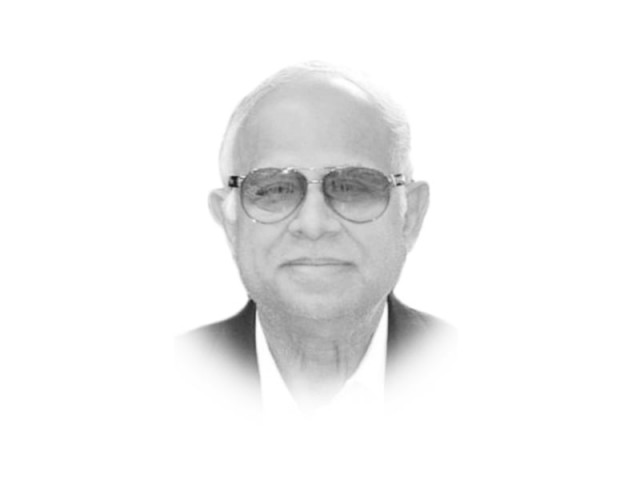Preserving society and the nation
Recording the dissent of the minority, we must move to implement the National Action Plan in letter and spirit

The writer is a defence and security analyst, chairman of the Pathfinder Group and director of the East West Institute
When there is a natural corollary of the individual having such rights, why are we even engaged in debating the collective right of society and the nation to preserve and defend itself against terrorism? We have to bring the terrorists’ fight to their doorsteps; we cannot sit around in blissful apathy for them to act. Successful in counter-insurgency operations in Swat and Fata, the army capped this by Operation Zarb-e-Azb in North Waziristan. There is frustration among the rank and file as many of the terrorists in urban areas are walking free. The divided political will to go after the roots of terrorism in the urban areas has now finally been harnessed after the dreadful Peshawar APS incident. For the record, the 21st Amendment and the amendments in the Pakistan Army Act were passed by the National Assembly and the Senate without any dissenting votes. Recording their dissent by abstaining, two religious parties, importantly, did not cast any negative votes.
Taking the analogy of self-defence further, the army unit/sub-unit detailed for “Aid to Civil Power” in a riot situation acts strictly according to the procedure given in the Manual for Pakistan Military Law. If the police fails to quell riots even after opening fire on rioters, the magistrate on duty hands control over to the unit/sub-unit commander present on the spot, authorising the opening of fire on rioters because the lives and properties of common citizens is threatened. Even if the magistrate is not present, it is the responsibility of the officer to take action on his own cognisance to protect the lives and properties of common citizens.
Carrying out the orders, the soldiers shoot to kill as simply causing injuries may encourage protestors to escalate the violence when they know that their lives are not in danger, further aggravating the situation. The logic is that shock tactics will disperse the rioters and prevent more shooting, which could lead to many more deaths. The ring leaders in the mob are often targeted. Unfortunately, the relatively less guilty in the line of fire are considered collateral damage. Every community has the right of self-defence. By inference, such collateral damage in such a summary justice situation is acceptable where an individual becomes the judge, jury and executioner. Then why is the process of justice through military courts not acceptable?
Asif Ali Zardari has convenient amnesia about his providing a legal framework for the army to operate in Khyber-Pakhtunkhwa. Why did respected constitutional experts like Raza Rabbani and Aitzaz Ahsan fail to stop him from promulgating the Actions in Aid of Civil Power Regulation 2011 (AACPR 2011) on June 23, 2011, backdating it to February 1, 2008? To quote the then president, “miscreants are waging war against Pakistan, attacking infrastructure through illegal private armies and trying to assert control over the territories of Pakistan”. Measures included the mobilisation of the armed forces in aid of civil power or their requisition by the provincial or federal governments, armed action, stationing of troops, etc. till their withdrawal by the government. Meant to cover the weaknesses in the Qanoon-i-Shahadat 1984 (derived from the Evidence Act 1872) that allows any good lawyer to help get his guilty client declared innocent, these regulations provide that a statement or deposition by any member of the armed forces, or any officer authorised on his behalf, would be sufficient to prove the facts for convicting an accused. If the AACPR 2011 is good enough for the citizens of Pakistan residing in Fata and Swat, why the discrimination in protecting citizens in the heartland of Pakistan? What was done by Zardari to qualm the conscience of Maulana Fazlur Rehman and Raza Rabbani then?
One respects those with a conscience but why did they choose to keep silent when the AACPR was enacted in 2011? With Zardari grandstanding and doing his u-turn and Senator Raza Rabbani shedding real tears now, the fact remains that he shed his conscience when voting for a bill because that was needed at the time. Neither unexpectedly nor surprisingly, Maulana Fazlur Rehman knows how and when to benefit from opportunity but the Jamaat-e-Islami’s Sirajul Haq stand was based on principles. Terrorism is not going anywhere if we are selective about excluding anyone who has links to terrorism of any kind. Terrorism must be targeted across the board and action cannot be confined to only those using religion and/or sect in this regard.
The 21st Amendment is a start. It has to be further refined. Meanwhile, the country cannot be held hostage by technicalities. Something is better than nothing. Recording the dissent of the minority, we must move to implement the National Action Plan in letter and spirit. This is the moment of truth. Preserving our society and the nation must take precedence over everything else.
Published in The Express Tribune, January 8th, 2015.
Like Opinion & Editorial on Facebook, follow @ETOpEd on Twitter to receive all updates on all our daily pieces.














COMMENTS
Comments are moderated and generally will be posted if they are on-topic and not abusive.
For more information, please see our Comments FAQ